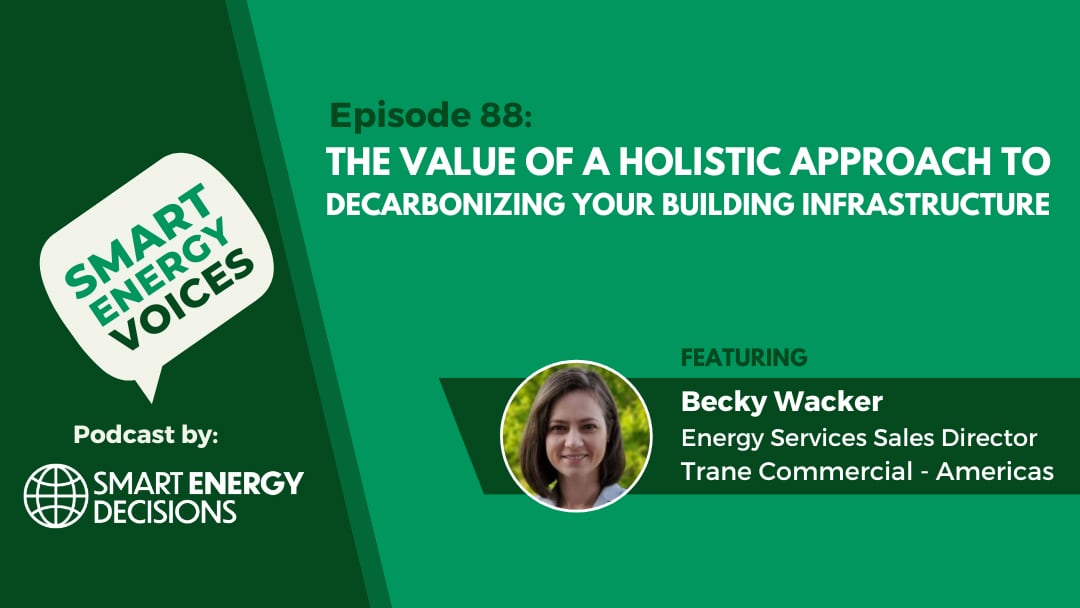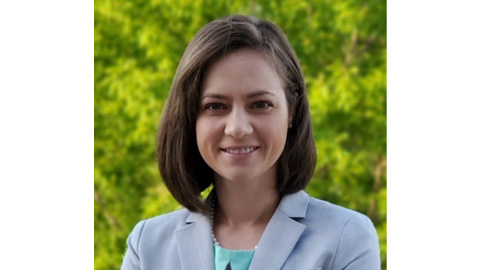Webinar
Overcoming the Biggest Hurdles in Decarbonizing Buildings
In this episode of Smart Energy Voices, produced in partnership with Trane, host Debra Chanil welcomes Becky Wacker. Becky is the Director of Energy Services Sales for Trane Commercial Americas. They discuss the challenges and opportunities that commercial building operators face today in light of decarbonization.

Webinar Details
- Duration
- 43 minutes
Quick Facts
- Topics
- Sustainability • Cost-Saving • Efficiency • Energy Services

In this session, we delve into facility decarbonization, where complexity abounds, and decision-making intersects with organizational priorities. We’ll take you along as we explore a real-life example of a client journey to meet bold decarbonization goals. Join us to explore the levers of decarbonization and strategies that expedite initiatives for organizations with existing buildings.
Learning Objectives:
- Exploring stakeholder diversity and the imperative of alignment within complex organizations
- Demonstrating how decarbonization catalyzes progress across broader building and organizational goals
- Analyzing the impact of system designs and solutions on the decarbonization journey
- Leveraging building data for informed decision-making, monitoring, accountability, and reporting
Speaker
-

Becky Wacker
Becky Wacker is the Director of Energy Services Sales for the Americas, leading acquisition and implementation of complex facility programs and projects. She has 15 years of experience helping customers leverage their buildings to better meet their organizational goals, with a particular passion for decarbonization and efficiency.
She received her Bachelor of Science degree in Aerospace Engineering from the University of Minnesota while winning two Division I National Championships with the Women’s Ice Hockey team.
Becky sits on the board for Clean Energy Economy Minnesota (CEEM) and NAESCO, and can often be found in a sports venue playing, watching, or coaching in her spare time.
-
Keri Taylor
Keri serves as Services Sales Leader for Trane, headquartered for North America in Davidson, NC. Trane®, a brand of Trane Technologies, is a world leader in climate solutions. Keri is responsible for growing, managing, collaborating and innovating services sales across all Trane North American offices. Additionally, she works with product management, training, marketing, and other key stakeholders to partner to expand, engage, and promote Trane’s customer focused products and services. She has held several roles at Trane including the Director of Trane Key Accounts Service, Director of Strategic Sales for CRE (Commercial Real Estate) and as the vertical market leader for CRE and helps guide thought leadership and innovation for the industry. Keri has been with Trane/Ingersoll Rand since 2011 and has had a significant impact in helping achieve its goals in the CRE & Trane’s Service Segment and continues to be recognized as a leader across all divisions of Trane Technologies.
Keri Taylor is also an active member of the Building Owners & Managers Association (BOMA) International’s Association, BOMA Fellow, Past International Community Service Committee Chair, former Executive Committee member and an active industry thought leader, speaker, and participant on many of BOMA’s regional and International committees. She has a Bachelor of Science in Business Administration with an emphasis in Marketing and Management from the University of Kentucky’s Business school and is an Alpha Omicron Pi alum.

